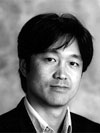Invited Speech
Wednesday August 20,
Prof. Tetsuya Iwasaki (University of Virginia)
"Feedback Control for Oscillation by Central Pattern Generator"
 Abstract.
Abstract.
Rhythmic body movements observed in animal locomotion such as walking, swimming, flying, etc., are known to be controlled by neuronal circuits called central pattern generators (CPGs). Such biological control systems based on CPGs may provide a new paradigm for feedback control theory to achieve oscillations (rather than regulations) in a robust, adaptive, and autonomous manner. The first part of this talk focuses on the analysis and design of (artificial) CPGs. The CPG is modeled as an interconnection of a set of identical neurons, each of which is described by a band-pass filter followed by a static nonlinearity. The CPG analysis problem is to estimate the oscillation profile (frequency, amplitudes, phases) directly from the CPG model without numerical simulations. The CPG design problem is to find the neuronal interconnection matrix that results in a prescribed oscillation profile. We will address these problems approximately by the method of harmonic balance, and exactly within the framework of circulant interconnections. The second part of the talk considers the CPG-based feedback control design for achieving oscillations of mechanical systems. CPGs are energy efficient controllers that cooperate with biomechanical and environmental constraints through sensory feedback. We will show the conditions under which a CPG tends to induce natural rhythmic motion of multibody collocated systems, achieving robust entrainment to a mechanical resonance.
Biography.
Tetsuya Iwasaki received BS and MS degrees in Electrical and Electronic Engineering from Tokyo Institute of Technology in 1987 and 1990, and a Ph.D degree in Aeronautics and Astronautics from Purdue University in 1993. After holding a faculty position at Tokyo Institute of Technology, he moved to the University of Virginia in May 2000, where he is currently Professor. His research interests include robust and optimal control, and modeling and analysis of biological locomotion systems. He has received the Pioneer Prize from the Society of Instrument and Control Engineers (SICE) in 2002, a CAREER Award from the National Science Foundation (NSF) in 2003, the George S. Axelby Outstanding Paper Award from the Institute of Electrical and Electronic Engineers (IEEE) in 2006, and the Rudolf Kalman Best Paper Award from the American Society of Mechanical Engineers (ASME) in 2007. He has served on the Editorial Boards of IEEE Transactions on Automatic Control, IFAC Automatica, Systems & Control Letters, and International Journal of Robust and Nonlinear Control.
 Abstract.
Abstract.